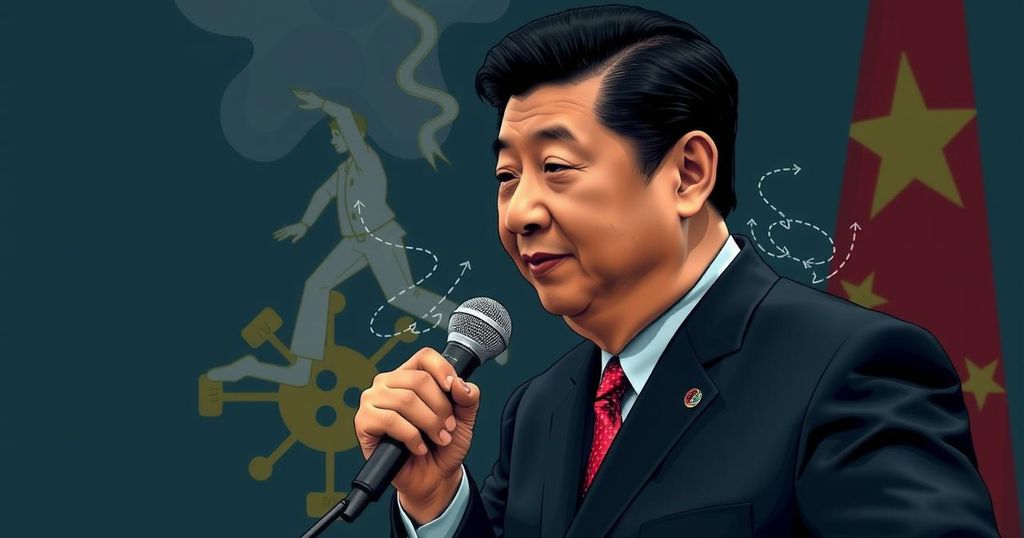The Risks of Xi Jinping’s Authoritarian Gambit
The deployment of North Korean troops in Russia to assist in the Ukraine war highlights the fragile alliance among authoritarian states, including Russia, China, Iran, and North Korea. While this coalition presents a united front against perceived American dominance, internal divisions exist, especially for China, whose aspirations are tempered by its economic ties to the West. The complexities of Xi Jinping’s strategy might lead to unintended consequences for China, including economic repercussions and geopolitical instability.
The recent positioning of North Korean troops in Russia, ostensibly to provide support in President Vladimir Putin’s ongoing military campaign in Ukraine, has raised significant concerns among Western nations regarding a potential axis of authoritarian states undermining democratic interests. While it is evident that an authoritarian coalition exists involving Russia, China, Iran, and North Korea—all of whom share an anti-American sentiment—the stability of this alliance is tenuous and highly dependent on China’s capacity to manage the resulting chaos. The Ukraine conflict has illuminated the collaborative endeavors of these four nations against perceived American hegemony. Following Russia’s invasion of Ukraine in 2022, it has significantly relied on Iranian resources, such as drones and missiles. Furthermore, actions taken by the U.S. government in October reflect a growing concern over Chinese corporations cooperating with Russia to manufacture military drones. U.S. officials assert that China has been supplying essential components that maintain Russia’s military operations. The arrival of North Korean troops, who appear poised to engage in combat alongside Russian forces, is a matter of grave concern, with U.S. Defense Secretary Lloyd Austin indicating that North Korean involvement would present serious implications on a global scale. Notably, an undercurrent of discord exists among these authoritarian regimes. Russia’s aggressive expansionism contrasts with the positions of Iran and North Korea, who, isolated and impoverished, view their collaboration as a means of gaining leverage against the West. In contrast, China’s situation is more complex; it seeks to challenge the existing world order while simultaneously valuing its economic ties to the U.S. and its allies. As such, Xi Jinping, the Chinese leader, has opted for a cautious strategy, aiming to uphold a degree of stability beneficial for China’s economic interests while extending its geopolitical influence. Despite U.S. calls for China to mitigate North Korea’s engagement with Russia, Xi’s actions suggest an unwillingness to leverage his influence. His meeting with President Putin preceded the revelation about the North Korean troops, signaling a tacit endorsement of these developments. Consequently, one could argue that China is inadvertently financing the volatility instigated by other autocracies. The collective reliance of Russia, Iran, and North Korea on Chinese trade highlights this dynamic, with China acquiring significant portions of their exports, including oil and military support. Such interdependence emboldens these nations to pursue aggressive policies, knowing they have the backing of a powerful ally, albeit with potential repercussions for China’s economy. The fallout from these geopolitical tensions poses risks for China; disruptions in energy markets and escalated conflicts could adversely affect its growth. The recent North Korean troop deployment could potentially escalate the Ukrainian conflict, prompting allied nations, such as South Korea, to enhance their military support to Ukraine, which would further strain China’s position. Should this situation escalate, increased sanctions from the U.S. and European nations could be directed towards China, exacerbating its vulnerabilities. Ultimately, China’s foreign policy presents a paradox: it endeavors to dismantle the existing international order while simultaneously navigating that very framework for its benefit. Xi’s strategy involves reducing dependency on U.S. markets through the pursuit of self-sufficiency and fostering trade relations with developing nations. In the long term, this could empower China to unequivocally support destabilizing regimes. However, in the present moment, Xi appears willing to accept short-term chaos with the hope that China will emerge unscathed—a gamble that, should it fail, could ignite problems domestically and internationally. If the strategies of Xi Jinping’s friends falter, the repercussions may be dire for China, blurring the lines between alliances and enmities.
The current international political climate is marked by a coalition of autocratic states that seek to challenge established democratic norms. Prominent among these nations are Russia, China, Iran, and North Korea, united by a common disdain for the U.S. and its international policies. The situation has intensified with the ongoing Russia-Ukraine conflict, where each player is navigating complex political and economic landscapes that impact not only regional stability but also global economic interdependence. Understanding the motivations and interactions between these nations is essential in assessing future geopolitical developments, particularly regarding China’s strategic balance between promoting its interests while managing the consequences of its alliances.
In conclusion, the gathering of North Korean troops in Russia amid the ongoing conflict in Ukraine presents significant strategic challenges for China. While the authoritarian coalition appears to enhance China’s position against the West, it simultaneously introduces risks that could destabilize its economy and geopolitical ambitions. Xi Jinping’s cautious approach reflects the complexities of navigating an environment that threatens to undermine both immediate global stability and China’s long-term objectives. As tensions mount, the question remains as to the extent to which Xi may protect his interests without sacrificing his allies or, conversely, succumbing to the chaos they potentially bring.
Original Source: www.theatlantic.com




Post Comment